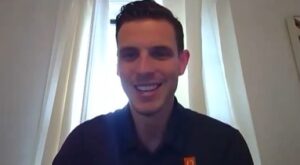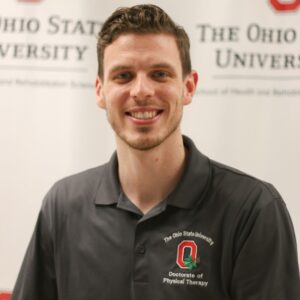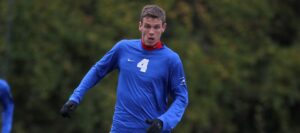
I would say the academic challenges I faced at UDM taught me how to think more critically which you can easily translate onto the field. You know you have to be a student of the game as much as you know you need to be a student in the classroom.
Pre-Health Advisor Carmen Gamlin had the opportunity to interview Detroit Mercy Alum and former Titan Soccer Athlete Dr. Adam Bedell. Adam talks about his time as a UDM Student and Athlete, his career as a Professional Soccer Player and now as a Physical Therapist. Here are the highlights from his interview.
- You are a Detroit Mercy Titan, tell us a fond memory of you being an undergraduate student there.
As a student athlete, I had the privilege of being surrounded by a fantastic group of players and friends…I’ll be remiss if I didn’t speak on my time there with them as my fondest memories being on campus. Being a student athlete presents a special set of circumstances and challenges especially studying biology or really any science major as I did. It’s not easy navigating that alone. You know I found it exponentially easier to deal with that stress thanks to my teammates and coaching staff.
As simple as it sounds, some of my fondest memories were spent with my teammates, either in the dining hall after a hard training session, you know, or in the quads playing video games. Trust me, there were studying that went on too. But you know, sometimes those long study nights weren’t the fondest of memories.
I truly enjoyed the chemistry I built with all of my teammates and classmates and I look back very fondly on those memories.
- You graduated from the University and transitioned to be a Professional Soccer Player. Are there any common traits about being a Science Student and a Professional Soccer Player?
I wouldn’t necessarily say there are similarities between a soccer player and a science student specifically, but I would say there are similarities to you know between being an athlete and a student in general. As I stated earlier, being a student athlete athlete presents you know, a unique challenge. One of those being able to allocate your time appropriately, as well as being extremely driven rather that being on the field or in the classroom.
I would say the academic challenges I faced at UDM taught me how to think more critically which you can easily translate onto the field. You know you have to be a student of the game as much as, you know, you need to be a student in the classroom.
So I will say some of the lessons learned in the academic side of things at UDM were certainly and indirectly translated onto the field.
- After a number of years as a Professional Soccer player you transitioned to Ohio State University and you have now launched a new career as a Doctor of Physical Therap. Do you Do you have any advice for undergraduates who are thinking about a career in physical therapy?

There a couple of universal pieces of advice that would be beneficial for people wanting to go to PT school and choose that career path.
First I will say and the most obvious. Its a bit cliché but get good grades. You know, PT schools are unbelievably competitive and many don’t admit a lot of students each year… For example Ohio State. Typically they get 500 to 600 applications every year for PT school and they admit 50 so it’s super competitive and you need to have that good base GPA to even get into that conversation of you know hey, this person have that GPA, lets look at their resume further.
Another piece of advice I can offer is to make yourself as marketable as possible! You know what does that mean necessarily? Don’t just be a good student right. If all you have to show on your resume or your application is a 4.0 GPA, you’re not going to get into PT School, anywhere. The PT profession is different than many other doctoring professions. You have to be personable, you know you have to be outgoing, you have to be devoted to serving others in your community. So I would say get out and volunteer in your community, shadow PTs in your area and get a feel of what the profession is like day to day and make sure that it’s actually something you want to do.
Lastly, I’d probably just tell students in the pre PT or any science major looking to transition to PT school is to get out and get a job as a rehab aide in a PT clinic. Its something I did for about a year and a half leading up to applying for PT school and getting into PT School. For me it definitely helped me get admitted, I’m sure of that. But it helped me one confirm that that’s what I wanted to do and two it just gave me that little step ahead of some of my other classmates, I think, that might not have had that exposure long term to what a PT clinic is, and what the day to day is.


